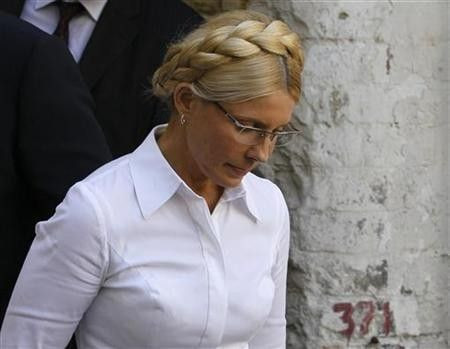Ukraine keeps ex-PM Tymoshenko in police custody

A judge Monday refused to release former Ukrainian Prime Minister Yulia Tymoshenko from police detention, increasing political tension around her trial on a charge of abuse of office.
Ukrainian special forces clashed with her supporters outside the courtroom on Kiev's main thoroughfare after the trial judge rejected for a third time pleas by her lawyers for her to be freed from police custody.
The charismatic 50-year-old politician has repeatedly refused to cooperate with judge Rodion Kireyev since her trial opened at the end of June and has denounced him as a "puppet" of President Viktor Yanukovich, her political opponent.
She was placed in police detention last Friday for contempt of court.
When the judge Monday refused a third request to release her and fixed the next hearing for Wednesday, scores of her supporters poured out on to the thoroughfare, temporarily blocking traffic.
Scuffles broke out as "Berkut" special forces poured into the area to clear a path for a police van to drive Tymoshenko away. Scores of supporters stood by chanting "Yulia! Yulia!" derisively at riot police.
Tymoshenko, who brought thousands on to the streets during the 2004 "Orange Revolution" protests, remains an iconic figure for many in parts of the ex-Soviet republic.
Her detention has prompted criticism from the United States -- an important backer for Kiev, which is drawing on a multi-billion dollar International Monetary Fund credit arrangement.
Adding to European Union criticism of her detention, Washington said in a statement that the ruling reinforced the impression that Tymoshenko's trial was politically motivated.
Since losing narrowly to Yanukovich in a presidential election in February 2010, Tymoshenko has failed to rally other opposition leaders around her. But, with her trademark peasant hair braid and combative style, she remains the most powerful opposition figure in Ukraine.
Her supporters and parliamentary allies have set up a tent encampment near the courthouse to show solidarity with her in scenes reminiscent of the 2004 "Orange" protests, though numbers of people are much smaller.
ARMOURED VAN
To avoid inflaming her supporters, police brought Tymoshenko to the Kiev courthouse in an armoured police van early Monday morning, about four hours before the hearing began.
Hundreds of special forces personnel waited in vans in streets nearby but made no move to break up the pro-Tymoshenko rally near the courthouse.
She had lost none of her fire for spending a weekend in prison.
"You know that I am not guilty of anything. I will not stand up for you," she told the judge when told to rise in court on Monday.
But one of her legal counsel, Yuri Sukhov, expressed fears for her health.
"Relatives have passed her food but she has eaten virtually nothing. She is profoundly anxious. I fear she could fall ill."
Tymoshenko's supporters said they remained resolved to secure her release from police custody.
"We have exhausted all political mechanisms. From now on, our future action will be carried out on the square," said Tymoshenko bloc deputy Serhiy Sobolev, meaning street protests would continue.
Despite Western criticism of the handling of the Tymoshenko trial, it does not, at the moment, seem likely to endanger financial aid from the IMF which is strictly linked to economic reform including raising gas prices.
But it could slow talks between the EU and Ukraine aimed at strengthening ties with the goal of forming a free trade zone.
Though Western governments have expressed concern that the trial looks like a vendetta, they put pressure on her to accept defeat by Yanukovich in February 2010 and have not shown much sympathy since over her protracted row with Yanukovich.
The abuse of office charge against her relates to the signing of a gas supply contract with Russia in 2009 while she was prime minister. The agreement ended a gas pricing dispute which had led to supplies being cut off to parts of the EU.
She denies charges by Ukrainian prosecutors that she coerced state energy company Naftogaz into agreeing to a deal with Russia's Gazprom that was against the national interest.
© Copyright Thomson Reuters {{Year}}. All rights reserved.




















